高中英语语法讲解 主谓一致课件(共40张PPT)
文档属性
| 名称 | 高中英语语法讲解 主谓一致课件(共40张PPT) | 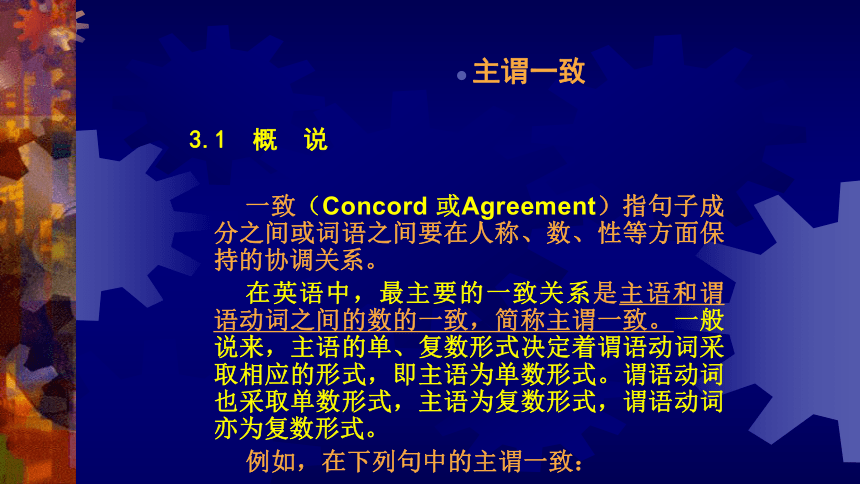 | |
| 格式 | zip | ||
| 文件大小 | 135.5KB | ||
| 资源类型 | 教案 | ||
| 版本资源 | 通用版 | ||
| 科目 | 英语 | ||
| 更新时间 | 2019-05-31 18:39:51 | ||
图片预览


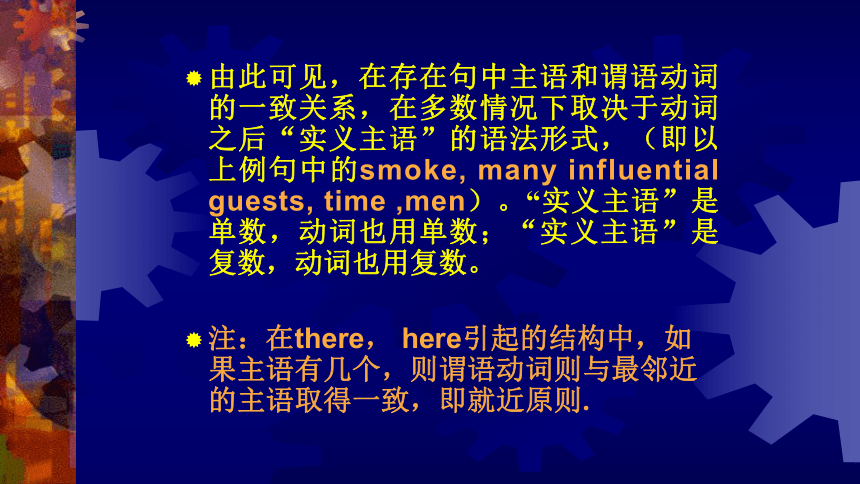
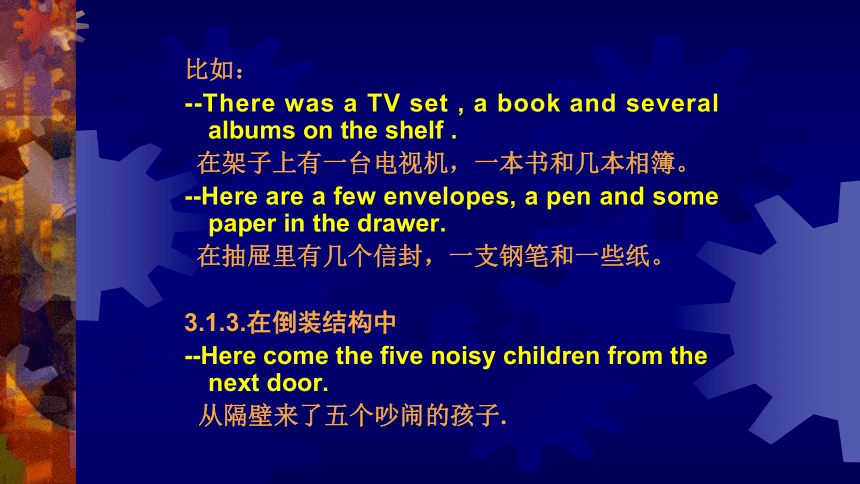
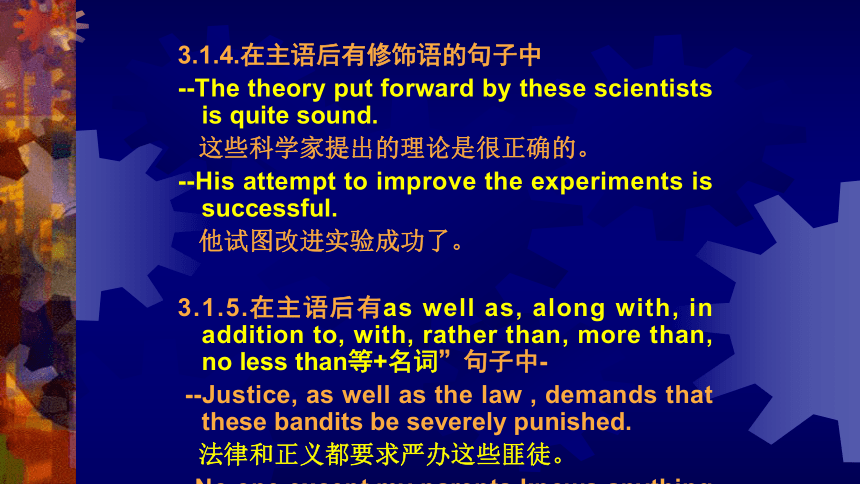

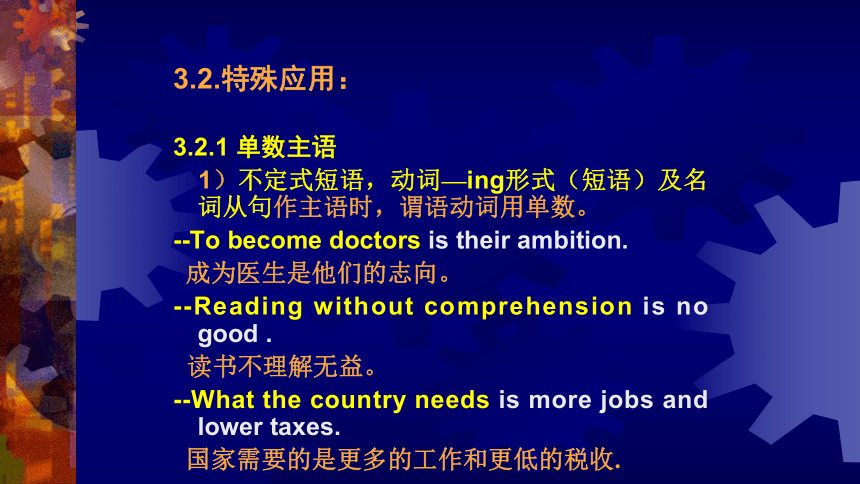
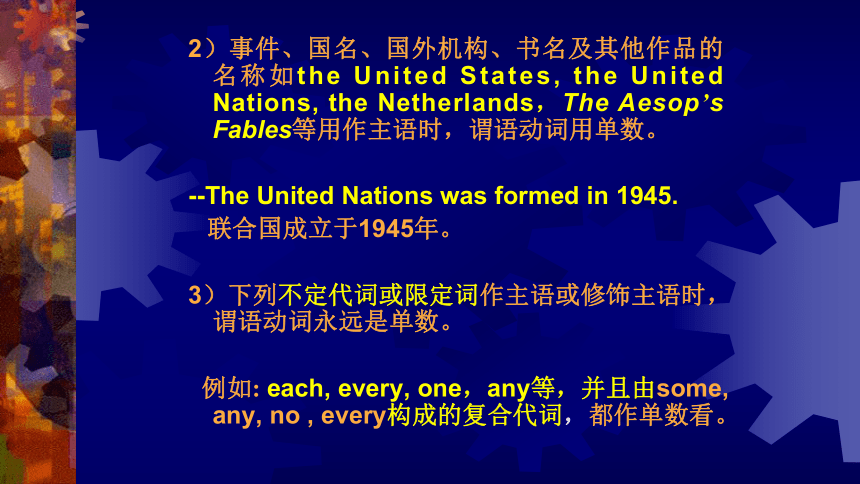
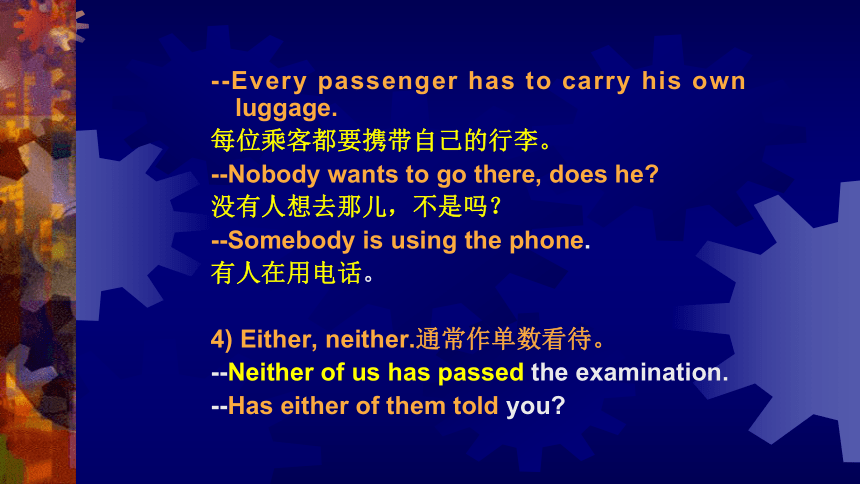
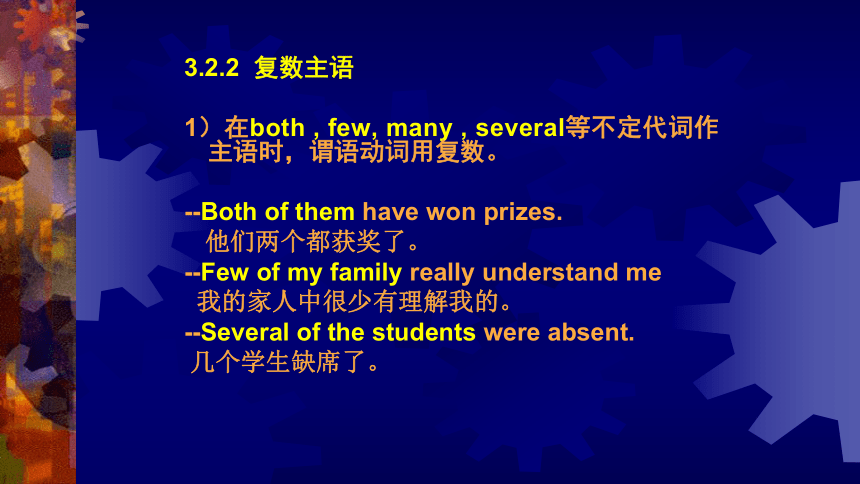
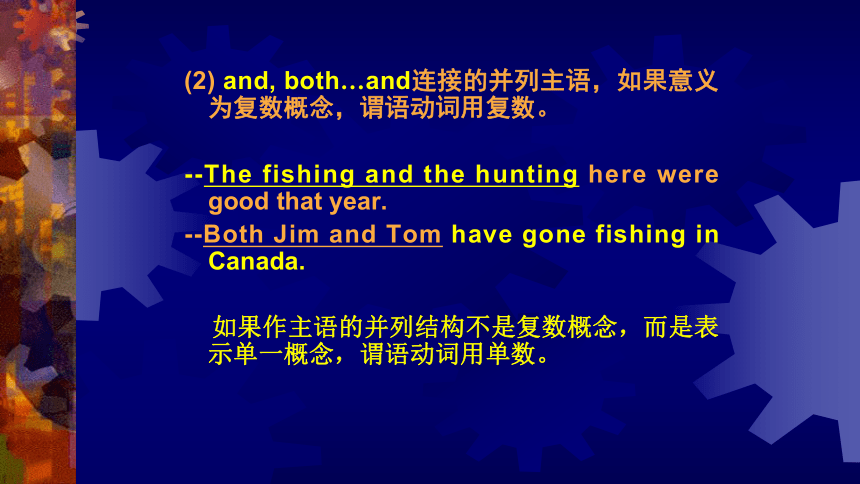

文档简介
课件40张PPT。主谓一致
?
3.1 概 说
?
一致(Concord 或Agreement)指句子成分之间或词语之间要在人称、数、性等方面保持的协调关系。
在英语中,最主要的一致关系是主语和谓语动词之间的数的一致,简称主谓一致。一般说来,主语的单、复数形式决定着谓语动词采取相应的形式,即主语为单数形式。谓语动词也采取单数形式,主语为复数形式,谓语动词亦为复数形式。
例如,在下列句中的主谓一致:
?
3.1.1.在语序正常的句子中
?--The burnt child fears the fire.
这个被烧伤的孩子害怕火。
?
3.1.2.在There be 结构中
?--There is no smoke without fire.
无风不起浪。
--There were not many influential guests at the Party.
在聚会中没有很多有影响力的宾客。
--There seems to be little time left.
似乎只剩一点时间了。
--There seem to be too many men in the field.
在田里似乎有很多人。
由此可见,在存在句中主语和谓语动词的一致关系,在多数情况下取决于动词之后“实义主语”的语法形式,(即以上例句中的smoke, many influential guests, time ,men)。“实义主语”是单数,动词也用单数;“实义主语”是复数,动词也用复数。
注:在there, here引起的结构中,如果主语有几个,则谓语动词则与最邻近的主语取得一致,即就近原则. 比如:
--There was a TV set , a book and several albums on the shelf .
在架子上有一台电视机,一本书和几本相簿。
--Here are a few envelopes, a pen and some paper in the drawer.
在抽屉里有几个信封,一支钢笔和一些纸。
?
3.1.3.在倒装结构中?
--Here come the five noisy children from the next door.
从隔壁来了五个吵闹的孩子.3.1.4.在主语后有修饰语的句子中
--The theory put forward by these scientists is quite sound.
这些科学家提出的理论是很正确的。
--His attempt to improve the experiments is successful.
他试图改进实验成功了。
3.1.5.在主语后有as well as, along with, in addition to, with, rather than, more than, no less than等+名词”句子中-
--Justice, as well as the law , demands that these bandits be severely punished.
法律和正义都要求严办这些匪徒。
--No one except my parents knows anything about it . 除了我父母没人知道这件事.
--The truck along with all its contents was destroyed.
--Bill, together with his sisters, was hurt in the accident.
--The manager with some workers was working during the holiday.
这就说明如果主语是单数,尽管后面跟有with, together with,as well as,no less than ,like, but ,except, besides等引起的短语,谓语动词仍旧用单数。
主谓一致说来简单,但在实际使用上往往会遇到复杂的情况,在此将进一步阐述. ?
3.2.特殊应用:
3.2.1 单数主语
1)不定式短语,动词—ing形式(短语)及名词从句作主语时,谓语动词用单数。
--To become doctors is their ambition.
成为医生是他们的志向。
--Reading without comprehension is no good .
读书不理解无益。
--What the country needs is more jobs and lower taxes.
国家需要的是更多的工作和更低的税收. 2)事件、国名、国外机构、书名及其他作品的名称如the United States, the United Nations, the Netherlands,The Aesop’s Fables等用作主语时,谓语动词用单数。
--The United Nations was formed in 1945.
联合国成立于1945年。
3)下列不定代词或限定词作主语或修饰主语时,谓语动词永远是单数。?
例如: each, every, one,any等,并且由some, any, no , every构成的复合代词,都作单数看。 --Every passenger has to carry his own luggage.
每位乘客都要携带自己的行李。
--Nobody wants to go there, does he?
没有人想去那儿,不是吗?
--Somebody is using the phone.
有人在用电话。
4) Either, neither.通常作单数看待。
--Neither of us has passed the examination.
--Has either of them told you?
3.2.2 复数主语
1)在both , few, many , several等不定代词作主语时,谓语动词用复数。
--Both of them have won prizes.
他们两个都获奖了。
--Few of my family really understand me
我的家人中很少有理解我的。
--Several of the students were absent.
几个学生缺席了。
(2) and, both…and连接的并列主语,如果意义为复数概念,谓语动词用复数。
?
--The fishing and the hunting here were good that year.
--Both Jim and Tom have gone fishing in Canada.
?
如果作主语的并列结构不是复数概念,而是表示单一概念,谓语动词用单数。
--To try and fail is better than not to try at all.
--The iron and steel industry plays an important part in our national economy.
--Ham and eggs is a good breakfast.
--The hammer and sickle is flying from a tall flagpole.
--The tenth and last chapter was translated into Russia.
?
(3)部分以-s结尾的名词
1.英语中有一些由两部分组成的物体名称通常以-s结尾,如:scissors(剪子),pincers(钳子),glasses(眼镜),shorts(短裤),trousers(裤子), suspenders(吊裤带)等。这一类名词,如果不带“一把”、“一副”、“一条”等单位量词而单独使用,通常用复数。?
--My new trousers are black and white.
--Your suspenders/glasses are not here.
如果带有单位量词,则由单位量词的单复数形式决定动词的单复数形式。
--This pair of trousers isn’t mine.
--Two pairs of pincers are missing from my tool box.
2.还有一些以-s结尾的名词:
archives(档案), arms(武器), clothes(衣服), contents(内容、目录), fireworks(烟火、爆竹), goods(货物),remains(遗体), stairs(楼梯), wages(工资), thanks(谢意)等,通常用作复数。?
--The archives of the company are kept in the basement.
--The contents of this book are not fascinating.
--High wages often result in high prices.
3.凡是由-ings结尾的名词,通常用复数。如:
clippings(剪下来的东西), diggings(掘出的东西), earnings(收入), filings(锉屑), surroundings(周围的环境), sweepings(扫拢的垃圾)等.
--The sweepings of the room have been disposed of.
--Their earnings come to 500 dollars a week.
4.一些以-s结尾的单、复数同形的名词?
barracks(营房), headquarters(总部), means(方法、手段), series(系列), works(工厂), species(种类)等,随后动词的单复数形式取决于这些名词是用作单数,还是用作复数。
--A barracks was attacked by the enemy troops last night.
--Two barracks in the surburbs have been surrounded.
--Every means has been tried.
--All means have been tried.?
--A headquarters was set up to direct the operation.
--All the headquarters are in Paris.
--A series of pre-recorded tapes has been prepared for language lab use.
--There are two series of readers: one for beginners and the other for advanced students.
注意:有少数这类名词用作单数和用作复数意义不同。如:
?
--What is the odds? (有什么要紧?相当于What does it matter?)
--The odds are against/in favor of us.
(我们成功的机会很小/机会对我们很有利。=We are (not) likely to succeed.)
又如:remains用作“遗体”意义时,随后的动词常用复数.
--His remains lie in the churchyard.
--The remains of the martyr were buried at the foot of the hill.
但作“遗迹”或“剩余物”解时,用作单数。
--Here is the remains of a temple.
--The remains of the meal was fed to the dog. 3.2.3 带有量词的主语与谓语动词的一致
1)以表示确定数量的名词词组作主语.
?
数量概念分两类:?
确定数量:three months, five days
非确定数量:all of…, some of…, none of…,half of…等
? 1.当名词词组中心词为表示度量、时间等复数名词时,可把这些复数名词看作一个整体,谓语动词采取单数形式。
?--Fifteen miles seems like a long walk to me.
十五英里对我似乎是很长的路程。
?--Thirty dollars is not a big sum.
三十美元不是个大数目。
当然,在许多情况下,也可把这些复数名词看作一个个的个体,与复数形式的谓语动词搭配。
--The past four weeks have been the driest in the country’s history.
在这个国家的历史上,过去的四周是最干旱的。
--Three million tons of coal were exported that year.
这年出口了三百万吨煤。
--There were six dollars in each of the bags.
--Three weeks are allowed for making the necessary preparation.
给了三个星期来做必要的准备。
?2.如果作主语的名词词组是由“分数(或百分数)+of词组”构成,其动词形式依据of词组中的名词类别而定。
--Two-thirds of the people present are against the plan.
--Three-fourths of the surface of the earth is sea.
--Over sixty percent of the city was destroyed in the war.
--Thirty-five percent of the doctors are women.
3.两数相减或相除,动词用单数,两数相加或相乘,动词可用单数,也可用复数。
?--Forty minus fifteen is twenty-five.
-Forty divided by eight is five.
--Five times seven is/are thirty-five.
--Seven and five makes/make twelve.
4. 如果主语是one in/ one out of+复数名词,动词用单数。?
--One in ten students has failed the exam.
--One out of twenty was badly injured.
2) 以表示非确定数量的名词词组作主语
?
当名词词组中心词是表示“全体”“部分”“许多”“种类”等名词或代词时,谓语动词单复数形式有几点需注意:
1.当名词词组中心词是all, most , half或者是the rest , the remainder, all of…, some of…, none of…, most of…, half of…等, 如果所指为复数意义,动词用复数形式,如果所指为单数意义,动词用单数形式。
--The rest of the lecture is dull.
--The rest of the bicycles are on sale today.
--All is ready for the reception .
--All are eager to reach an agreement.
--Most of the money was spent on books.
--Most of the students were there.
--All of the fruit looks ripe.
--All of the passengers were saved.
2.none:作复数看待时较多,但也有时作单数看待,主要看说话人脑中联系想到的是复数还是单数概念。?
--None of the books are easy enough for us .这些书全太难,不太适合我们的水平。
--None of us has got a camera.
我们中间没有一个人有照相机。
注:none在代表不可数的东西时总是看作单数。
--None of this worries me.
这事一点也不使我着急。
3.当主语是由“lots of ,heaps of , loads of , scads of,plenty of 等+名词构成,表示“许许多多”等概念时,如果所跟的名词是单数形式,则动词采取单数形式,如果跟的名词是复数形式,则动词也采取复数形式。
?
--Lots of people are waiting outside.
很多人正在外等待。
--Lots of staff is going to waste.
很多工作人员无事可做,将是种浪费。
--There were scads of opportunities for all of us. 我们有许多机会。
--Scads of money was needed.
需要大量金钱。
4.当主语是由“a portion of , a series of , a kind of 等+名词”构成,或主语是由a deal (amount, quantity, proportion) of+不可数名词构成,谓语动词一般用单数形式。
?
--A portion of goods has been transported to the city .
一部分商品已被运往城市。
--A series of accidents has been reported.
报道了一系列的事故.
--A deal of fish has been sold at the market. 很多鱼在市场上出售。
注: 在“this kind/sort/type of +名词”之后,无论名词是单数还是复数,动词都用单数形式。
--This kind of man annoys me .
这种人使我恼怒。
--This kind of men is dangerous.
这种人危险。
但是如果以men作名词词组中心词,其后的动词就要用复数形式。
--Men of this kind are dangerous.
有时,kind of 之前的限定词和之后的名词都用复数形式these, those,这时谓语动词也用复数形式。
--These kind of men annoy me.
这些这样的人使我恼怒。
5.当主语为“what kind of +名词”时,其后动词的单复数形式要视kind的单复数形式而定。?
--What kinds of cherry tree flourish best in this region?
--What kind of cherry tree flourishes best in this region?
在这个地区什么样的樱桃树长得最茂盛?
?
6.如果主语是many a+名词或more than one +名词构成,意义虽属多数,但随后动词仍用单数。
?--Many a boy has come here.
--More than one game was lost.
3.2.4 并列主语
1)由and或both…and 连接两个主语时,谓语动词一般用复数。
--He and I are good friends.我和他是好朋友。
--Both John and Mary are ready.
约翰和玛丽都准备好了。
但是当并列主语作为整体考察,或在意义上指同一个人,同一事物时,谓语动词用单数;特别是当and前的名词或代词前有冠词the,而and后的名词或代词前没有冠词the时,须用单数谓语。
--Ice cream and cake is my favorite dessert.
冰淇淋和蛋糕是我最喜欢的甜点。
--The editor and publisher of this magazine is a very able man.
这家杂志的编辑和出版者是个很有能力的人。
--Bread and butter is often preferred to cakes.
面包和黄油常比蛋糕更受欢迎.
类似的名词短语有:
ham and eggs. law and order, the needles and thread, a cup and saucer, meat and potatoes. cause and effect, the ebb and flow, fish and chips
有些带连词and的省略结构形似单数,而意义为复数,随后动词用复数。?
--What I say and think are no business of yours.
--Good and bad taste are inculcated by example.
在上述两例中,What I say and think=What I say and what I think; Good and bad taste=good taste and bad taste
但是当and连接的并列主语带有each, every,或many a等限定词时,随后的动词通常用单数。
?--Every boy and every girl in this room has got a copy.
--Each man and each woman there is asked to help.
--Many a boy was disappointed after seeing the film.
?
2)由or ,either…or ,或neither…nor 连接两个单数主语时,谓语动词用单数。
--Either Tom or Mary is sure to know the answer.
--Neither you nor I am wrong.
3)当or, either…or, neither…nor或not only…but(also)连接一个单数主语和一个复数主语时,谓语动词取决于最接近它的名词或代词的数。
--Neither the quality nor the prices have changed.
--Neither the prices nor the quality has changed.质量或价格都没变。
?
3.2.5 集体名词作主语?
集体名词作主语时,谓语动词的数取决于主语表示的意义,当主语表示不可分割的集体时,谓语动词用单数;当主语强调集体中的各个成员时,谓语动词用复数.
这类名词有crowd, army, audience, band, board, class, club, committee, company, crew, firm,family gang, staff, team, troop,government, etc.
--The television public (观众)is increasing rapidly.
--The public (公众)are tired of demonstrations.公众已对示威感到厌烦。
- The audience were greatly moved at the word.听众被这句话深深打动了。
这类名词作主语的主谓一致问题往往在于对“语法一致”和“意义一致”两种原则的选择,通常遵循以下规则:
1.通常用作复数的集体名词
?如:cattle,militia,people,police,poultry(家禽), vermin(害虫)
Cattle are grazing on the pasture.
有牛在草场上吃草.
The audience was enormous.(听众多得惊人。) ---such vermin as bugs and rats are hard to get rid of.
--The militia were drilling on the playground.
--The British police have only very limited powers.
--The Chinese people are hard-working.
?
2.通常作不可数名词的集体名词
?如machinery, equipment, furniture, merchandise, advice, information等,虽然是集体名词,但属不可数名词,后面动词用单数。?
-A lot of machinery was imported from abroad.
--The merchandise has arrived undamaged.
3.既可作单数也可作复数的集体名词
?有些集体名词如:audience, committee, class, crew(全体船员或机组人员), family, government, team, public(公众)等,既可作单数,也可作复数。如将这些名词所表示的集体视为一个整体,则动词用单数。?
--The football team is being organized.
--The football team are having baths .
--The class are taking notes, their pens writing quickly over their exercise books
--The public were convinced of his innocence.
--The family is the basic unit of our society.
--My family are all football fans.
?3.2.6 形容词从句中的主谓一致
1.关系代词作主语时,它的数必须与其先行词一致。?
--The person who gets there first is served first. 先到这儿的人先受招待。
2.在正式语体中,“one of those+复数名词”后的形容词从句中的谓语动词用复数。
--Jane is one of those persons who always think they are right. 简是那些总认为自己正确的人中的一个。
但是,当one前面有the only等修饰时,形容词从句中的谓语动词用单数。
--She is the only one of those girls who is willing to help him.
她是那些女孩中唯一的一个愿意帮助他的人。
3.2.7 其它情况下的主谓一致
?1.一些以--s结尾的表示疾病的名词作主语时,谓语动词一般用单数,如mumps(流行性腮腺炎),arthritis(关节炎),bronchitis(支气管炎),measles(麻疹),rickets(软骨病)等。?
--Measles(麻疹)is a disease to take seriously.麻疹被认为是一种严重的疾病。
--He suffered from diabetes, which is a kind of chronic disease.
他患有糖尿病,这是一种慢性病。
--Mumps is a kind of infectious disease.
腮腺炎是一种传染病。 2.有些以--ics结尾的名词,如ethics, politics, statistics economics, electronics, mathematics, civics(公民学),,acoustics等用来表示“科学领域”时,谓语动词用单数;用来表示具体“行为”、“观点”、“数字”时,谓语动词用复数。
----Statistics(统计学)is a field of study.
--The statistics(统计数字) in that report are not accurate.?
--Acoustics(声学) is the science of sound.
--The acoustics(音响效果) in the new concert hall are faultless.?
--What are his politics?(政治观点)
--The economics(经济效益) of the project are still being considered.
?
3.Chinese, Japanese, English, French等词指语言时,用单数;指人民时,用复数。
?--Chinese(汉语) is a difficult language to learn.
--The Chinese(中国人) are kind and friendly.
4.“The +adj. /—ed分词”作主语如果表示一类人,谓语动词用复数。
?--The young are full of vigor.年青人充满活力。
--The injured were taken to hospital.受伤的人被送进了医院。
?
3.1 概 说
?
一致(Concord 或Agreement)指句子成分之间或词语之间要在人称、数、性等方面保持的协调关系。
在英语中,最主要的一致关系是主语和谓语动词之间的数的一致,简称主谓一致。一般说来,主语的单、复数形式决定着谓语动词采取相应的形式,即主语为单数形式。谓语动词也采取单数形式,主语为复数形式,谓语动词亦为复数形式。
例如,在下列句中的主谓一致:
?
3.1.1.在语序正常的句子中
?--The burnt child fears the fire.
这个被烧伤的孩子害怕火。
?
3.1.2.在There be 结构中
?--There is no smoke without fire.
无风不起浪。
--There were not many influential guests at the Party.
在聚会中没有很多有影响力的宾客。
--There seems to be little time left.
似乎只剩一点时间了。
--There seem to be too many men in the field.
在田里似乎有很多人。
由此可见,在存在句中主语和谓语动词的一致关系,在多数情况下取决于动词之后“实义主语”的语法形式,(即以上例句中的smoke, many influential guests, time ,men)。“实义主语”是单数,动词也用单数;“实义主语”是复数,动词也用复数。
注:在there, here引起的结构中,如果主语有几个,则谓语动词则与最邻近的主语取得一致,即就近原则. 比如:
--There was a TV set , a book and several albums on the shelf .
在架子上有一台电视机,一本书和几本相簿。
--Here are a few envelopes, a pen and some paper in the drawer.
在抽屉里有几个信封,一支钢笔和一些纸。
?
3.1.3.在倒装结构中?
--Here come the five noisy children from the next door.
从隔壁来了五个吵闹的孩子.3.1.4.在主语后有修饰语的句子中
--The theory put forward by these scientists is quite sound.
这些科学家提出的理论是很正确的。
--His attempt to improve the experiments is successful.
他试图改进实验成功了。
3.1.5.在主语后有as well as, along with, in addition to, with, rather than, more than, no less than等+名词”句子中-
--Justice, as well as the law , demands that these bandits be severely punished.
法律和正义都要求严办这些匪徒。
--No one except my parents knows anything about it . 除了我父母没人知道这件事.
--The truck along with all its contents was destroyed.
--Bill, together with his sisters, was hurt in the accident.
--The manager with some workers was working during the holiday.
这就说明如果主语是单数,尽管后面跟有with, together with,as well as,no less than ,like, but ,except, besides等引起的短语,谓语动词仍旧用单数。
主谓一致说来简单,但在实际使用上往往会遇到复杂的情况,在此将进一步阐述. ?
3.2.特殊应用:
3.2.1 单数主语
1)不定式短语,动词—ing形式(短语)及名词从句作主语时,谓语动词用单数。
--To become doctors is their ambition.
成为医生是他们的志向。
--Reading without comprehension is no good .
读书不理解无益。
--What the country needs is more jobs and lower taxes.
国家需要的是更多的工作和更低的税收. 2)事件、国名、国外机构、书名及其他作品的名称如the United States, the United Nations, the Netherlands,The Aesop’s Fables等用作主语时,谓语动词用单数。
--The United Nations was formed in 1945.
联合国成立于1945年。
3)下列不定代词或限定词作主语或修饰主语时,谓语动词永远是单数。?
例如: each, every, one,any等,并且由some, any, no , every构成的复合代词,都作单数看。 --Every passenger has to carry his own luggage.
每位乘客都要携带自己的行李。
--Nobody wants to go there, does he?
没有人想去那儿,不是吗?
--Somebody is using the phone.
有人在用电话。
4) Either, neither.通常作单数看待。
--Neither of us has passed the examination.
--Has either of them told you?
3.2.2 复数主语
1)在both , few, many , several等不定代词作主语时,谓语动词用复数。
--Both of them have won prizes.
他们两个都获奖了。
--Few of my family really understand me
我的家人中很少有理解我的。
--Several of the students were absent.
几个学生缺席了。
(2) and, both…and连接的并列主语,如果意义为复数概念,谓语动词用复数。
?
--The fishing and the hunting here were good that year.
--Both Jim and Tom have gone fishing in Canada.
?
如果作主语的并列结构不是复数概念,而是表示单一概念,谓语动词用单数。
--To try and fail is better than not to try at all.
--The iron and steel industry plays an important part in our national economy.
--Ham and eggs is a good breakfast.
--The hammer and sickle is flying from a tall flagpole.
--The tenth and last chapter was translated into Russia.
?
(3)部分以-s结尾的名词
1.英语中有一些由两部分组成的物体名称通常以-s结尾,如:scissors(剪子),pincers(钳子),glasses(眼镜),shorts(短裤),trousers(裤子), suspenders(吊裤带)等。这一类名词,如果不带“一把”、“一副”、“一条”等单位量词而单独使用,通常用复数。?
--My new trousers are black and white.
--Your suspenders/glasses are not here.
如果带有单位量词,则由单位量词的单复数形式决定动词的单复数形式。
--This pair of trousers isn’t mine.
--Two pairs of pincers are missing from my tool box.
2.还有一些以-s结尾的名词:
archives(档案), arms(武器), clothes(衣服), contents(内容、目录), fireworks(烟火、爆竹), goods(货物),remains(遗体), stairs(楼梯), wages(工资), thanks(谢意)等,通常用作复数。?
--The archives of the company are kept in the basement.
--The contents of this book are not fascinating.
--High wages often result in high prices.
3.凡是由-ings结尾的名词,通常用复数。如:
clippings(剪下来的东西), diggings(掘出的东西), earnings(收入), filings(锉屑), surroundings(周围的环境), sweepings(扫拢的垃圾)等.
--The sweepings of the room have been disposed of.
--Their earnings come to 500 dollars a week.
4.一些以-s结尾的单、复数同形的名词?
barracks(营房), headquarters(总部), means(方法、手段), series(系列), works(工厂), species(种类)等,随后动词的单复数形式取决于这些名词是用作单数,还是用作复数。
--A barracks was attacked by the enemy troops last night.
--Two barracks in the surburbs have been surrounded.
--Every means has been tried.
--All means have been tried.?
--A headquarters was set up to direct the operation.
--All the headquarters are in Paris.
--A series of pre-recorded tapes has been prepared for language lab use.
--There are two series of readers: one for beginners and the other for advanced students.
注意:有少数这类名词用作单数和用作复数意义不同。如:
?
--What is the odds? (有什么要紧?相当于What does it matter?)
--The odds are against/in favor of us.
(我们成功的机会很小/机会对我们很有利。=We are (not) likely to succeed.)
又如:remains用作“遗体”意义时,随后的动词常用复数.
--His remains lie in the churchyard.
--The remains of the martyr were buried at the foot of the hill.
但作“遗迹”或“剩余物”解时,用作单数。
--Here is the remains of a temple.
--The remains of the meal was fed to the dog. 3.2.3 带有量词的主语与谓语动词的一致
1)以表示确定数量的名词词组作主语.
?
数量概念分两类:?
确定数量:three months, five days
非确定数量:all of…, some of…, none of…,half of…等
? 1.当名词词组中心词为表示度量、时间等复数名词时,可把这些复数名词看作一个整体,谓语动词采取单数形式。
?--Fifteen miles seems like a long walk to me.
十五英里对我似乎是很长的路程。
?--Thirty dollars is not a big sum.
三十美元不是个大数目。
当然,在许多情况下,也可把这些复数名词看作一个个的个体,与复数形式的谓语动词搭配。
--The past four weeks have been the driest in the country’s history.
在这个国家的历史上,过去的四周是最干旱的。
--Three million tons of coal were exported that year.
这年出口了三百万吨煤。
--There were six dollars in each of the bags.
--Three weeks are allowed for making the necessary preparation.
给了三个星期来做必要的准备。
?2.如果作主语的名词词组是由“分数(或百分数)+of词组”构成,其动词形式依据of词组中的名词类别而定。
--Two-thirds of the people present are against the plan.
--Three-fourths of the surface of the earth is sea.
--Over sixty percent of the city was destroyed in the war.
--Thirty-five percent of the doctors are women.
3.两数相减或相除,动词用单数,两数相加或相乘,动词可用单数,也可用复数。
?--Forty minus fifteen is twenty-five.
-Forty divided by eight is five.
--Five times seven is/are thirty-five.
--Seven and five makes/make twelve.
4. 如果主语是one in/ one out of+复数名词,动词用单数。?
--One in ten students has failed the exam.
--One out of twenty was badly injured.
2) 以表示非确定数量的名词词组作主语
?
当名词词组中心词是表示“全体”“部分”“许多”“种类”等名词或代词时,谓语动词单复数形式有几点需注意:
1.当名词词组中心词是all, most , half或者是the rest , the remainder, all of…, some of…, none of…, most of…, half of…等, 如果所指为复数意义,动词用复数形式,如果所指为单数意义,动词用单数形式。
--The rest of the lecture is dull.
--The rest of the bicycles are on sale today.
--All is ready for the reception .
--All are eager to reach an agreement.
--Most of the money was spent on books.
--Most of the students were there.
--All of the fruit looks ripe.
--All of the passengers were saved.
2.none:作复数看待时较多,但也有时作单数看待,主要看说话人脑中联系想到的是复数还是单数概念。?
--None of the books are easy enough for us .这些书全太难,不太适合我们的水平。
--None of us has got a camera.
我们中间没有一个人有照相机。
注:none在代表不可数的东西时总是看作单数。
--None of this worries me.
这事一点也不使我着急。
3.当主语是由“lots of ,heaps of , loads of , scads of,plenty of 等+名词构成,表示“许许多多”等概念时,如果所跟的名词是单数形式,则动词采取单数形式,如果跟的名词是复数形式,则动词也采取复数形式。
?
--Lots of people are waiting outside.
很多人正在外等待。
--Lots of staff is going to waste.
很多工作人员无事可做,将是种浪费。
--There were scads of opportunities for all of us. 我们有许多机会。
--Scads of money was needed.
需要大量金钱。
4.当主语是由“a portion of , a series of , a kind of 等+名词”构成,或主语是由a deal (amount, quantity, proportion) of+不可数名词构成,谓语动词一般用单数形式。
?
--A portion of goods has been transported to the city .
一部分商品已被运往城市。
--A series of accidents has been reported.
报道了一系列的事故.
--A deal of fish has been sold at the market. 很多鱼在市场上出售。
注: 在“this kind/sort/type of +名词”之后,无论名词是单数还是复数,动词都用单数形式。
--This kind of man annoys me .
这种人使我恼怒。
--This kind of men is dangerous.
这种人危险。
但是如果以men作名词词组中心词,其后的动词就要用复数形式。
--Men of this kind are dangerous.
有时,kind of 之前的限定词和之后的名词都用复数形式these, those,这时谓语动词也用复数形式。
--These kind of men annoy me.
这些这样的人使我恼怒。
5.当主语为“what kind of +名词”时,其后动词的单复数形式要视kind的单复数形式而定。?
--What kinds of cherry tree flourish best in this region?
--What kind of cherry tree flourishes best in this region?
在这个地区什么样的樱桃树长得最茂盛?
?
6.如果主语是many a+名词或more than one +名词构成,意义虽属多数,但随后动词仍用单数。
?--Many a boy has come here.
--More than one game was lost.
3.2.4 并列主语
1)由and或both…and 连接两个主语时,谓语动词一般用复数。
--He and I are good friends.我和他是好朋友。
--Both John and Mary are ready.
约翰和玛丽都准备好了。
但是当并列主语作为整体考察,或在意义上指同一个人,同一事物时,谓语动词用单数;特别是当and前的名词或代词前有冠词the,而and后的名词或代词前没有冠词the时,须用单数谓语。
--Ice cream and cake is my favorite dessert.
冰淇淋和蛋糕是我最喜欢的甜点。
--The editor and publisher of this magazine is a very able man.
这家杂志的编辑和出版者是个很有能力的人。
--Bread and butter is often preferred to cakes.
面包和黄油常比蛋糕更受欢迎.
类似的名词短语有:
ham and eggs. law and order, the needles and thread, a cup and saucer, meat and potatoes. cause and effect, the ebb and flow, fish and chips
有些带连词and的省略结构形似单数,而意义为复数,随后动词用复数。?
--What I say and think are no business of yours.
--Good and bad taste are inculcated by example.
在上述两例中,What I say and think=What I say and what I think; Good and bad taste=good taste and bad taste
但是当and连接的并列主语带有each, every,或many a等限定词时,随后的动词通常用单数。
?--Every boy and every girl in this room has got a copy.
--Each man and each woman there is asked to help.
--Many a boy was disappointed after seeing the film.
?
2)由or ,either…or ,或neither…nor 连接两个单数主语时,谓语动词用单数。
--Either Tom or Mary is sure to know the answer.
--Neither you nor I am wrong.
3)当or, either…or, neither…nor或not only…but(also)连接一个单数主语和一个复数主语时,谓语动词取决于最接近它的名词或代词的数。
--Neither the quality nor the prices have changed.
--Neither the prices nor the quality has changed.质量或价格都没变。
?
3.2.5 集体名词作主语?
集体名词作主语时,谓语动词的数取决于主语表示的意义,当主语表示不可分割的集体时,谓语动词用单数;当主语强调集体中的各个成员时,谓语动词用复数.
这类名词有crowd, army, audience, band, board, class, club, committee, company, crew, firm,family gang, staff, team, troop,government, etc.
--The television public (观众)is increasing rapidly.
--The public (公众)are tired of demonstrations.公众已对示威感到厌烦。
- The audience were greatly moved at the word.听众被这句话深深打动了。
这类名词作主语的主谓一致问题往往在于对“语法一致”和“意义一致”两种原则的选择,通常遵循以下规则:
1.通常用作复数的集体名词
?如:cattle,militia,people,police,poultry(家禽), vermin(害虫)
Cattle are grazing on the pasture.
有牛在草场上吃草.
The audience was enormous.(听众多得惊人。) ---such vermin as bugs and rats are hard to get rid of.
--The militia were drilling on the playground.
--The British police have only very limited powers.
--The Chinese people are hard-working.
?
2.通常作不可数名词的集体名词
?如machinery, equipment, furniture, merchandise, advice, information等,虽然是集体名词,但属不可数名词,后面动词用单数。?
-A lot of machinery was imported from abroad.
--The merchandise has arrived undamaged.
3.既可作单数也可作复数的集体名词
?有些集体名词如:audience, committee, class, crew(全体船员或机组人员), family, government, team, public(公众)等,既可作单数,也可作复数。如将这些名词所表示的集体视为一个整体,则动词用单数。?
--The football team is being organized.
--The football team are having baths .
--The class are taking notes, their pens writing quickly over their exercise books
--The public were convinced of his innocence.
--The family is the basic unit of our society.
--My family are all football fans.
?3.2.6 形容词从句中的主谓一致
1.关系代词作主语时,它的数必须与其先行词一致。?
--The person who gets there first is served first. 先到这儿的人先受招待。
2.在正式语体中,“one of those+复数名词”后的形容词从句中的谓语动词用复数。
--Jane is one of those persons who always think they are right. 简是那些总认为自己正确的人中的一个。
但是,当one前面有the only等修饰时,形容词从句中的谓语动词用单数。
--She is the only one of those girls who is willing to help him.
她是那些女孩中唯一的一个愿意帮助他的人。
3.2.7 其它情况下的主谓一致
?1.一些以--s结尾的表示疾病的名词作主语时,谓语动词一般用单数,如mumps(流行性腮腺炎),arthritis(关节炎),bronchitis(支气管炎),measles(麻疹),rickets(软骨病)等。?
--Measles(麻疹)is a disease to take seriously.麻疹被认为是一种严重的疾病。
--He suffered from diabetes, which is a kind of chronic disease.
他患有糖尿病,这是一种慢性病。
--Mumps is a kind of infectious disease.
腮腺炎是一种传染病。 2.有些以--ics结尾的名词,如ethics, politics, statistics economics, electronics, mathematics, civics(公民学),,acoustics等用来表示“科学领域”时,谓语动词用单数;用来表示具体“行为”、“观点”、“数字”时,谓语动词用复数。
----Statistics(统计学)is a field of study.
--The statistics(统计数字) in that report are not accurate.?
--Acoustics(声学) is the science of sound.
--The acoustics(音响效果) in the new concert hall are faultless.?
--What are his politics?(政治观点)
--The economics(经济效益) of the project are still being considered.
?
3.Chinese, Japanese, English, French等词指语言时,用单数;指人民时,用复数。
?--Chinese(汉语) is a difficult language to learn.
--The Chinese(中国人) are kind and friendly.
4.“The +adj. /—ed分词”作主语如果表示一类人,谓语动词用复数。
?--The young are full of vigor.年青人充满活力。
--The injured were taken to hospital.受伤的人被送进了医院。
